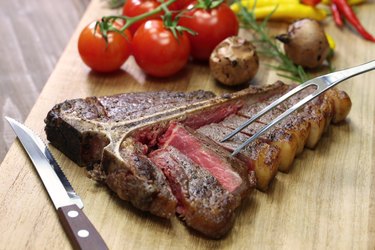
The giant, melt-in-your-mouth tender porterhouse steak is undoubtedly the king of steaks, containing both a New York strip and a filet mignon all in one. It's more common to pan-sear porterhouse to develop its crust then finish cooking it in the oven, but you can also pan-fry the steak all the way.
This is a quicker option, though it requires a bit more attention and interaction from you if your pan-fry a porterhouse. Done right, this is one of the tastiest, juiciest, most filling meals you're likely to experience; however, since it's a high-fat, high-calorie dish, reserve it for rare occasions.
Video of the Day
Video of the Day
Read more: How to Cook a Tender Steak on the Stove
Tip
Although a porterhouse steak is more commonly seared in a pan, then cooked in the oven, you can also pan-fry porterhouse if you're short on time.
Step 1: Add Some Salt
Pat the porterhouse dry with paper towels, then coat it with a liberal helping of coarse kosher or sea salt 1 to 2 hours ahead of time and let it rest on the counter. This draws out and seasons moisture from the beef.
Salting this far ahead provides enough time for the seasoned water to be reabsorbed into the steak; salt too close to cooking and the moisture that's drawn out evaporates in the pan instead, yielding drier meat. Add freshly cracked pepper to taste right before cooking.
Step 2: Heat the Pan
Heat a large cast iron, stainless steel or other high-quality heavy pan over medium-high heat for several minutes. Flick a few drops of water onto the pan; it's properly heated when they instantly sizzle and evaporate.
Coat the pan well with cooking oil and wait about 30 seconds for it to heat to the point of having a water-like consistency.
Step 3: Pan-Fry Porterhouse
Place the porterhouse in the pan and leave it in place for about 2 minutes. It will stick a little at first, but free when it develops a nice browning.
Turn it with tongs and sear the second side for another 2 minutes. Turn the steak back to the first side and reduce the burner to medium so you can continue frying without ending up with a burned exterior.
Step 4: Baste with Butter
Add a pat or two of unsalted butter into the pan. Let it melt, then turn the steak again. Baste the top of the New York strip side of the porterhouse often by spooning oil and butter over the top.
This helps cook it faster, which is beneficial because the smaller tenderloin flap — which has considerably less fat marbling — cooks faster than the longer top loin side of the steak.
Step 5: Check the Temperature
Flip the steak every minute or so as you continue cooking and basting it. The National Academy of Nutrition and Dietetics advises that you cook any steak to a minimum internal temperature of 145 degrees Fahrenheit, which is approximately a medium preparation.
If you prefer your porterhouse at a medium rare temp or even cooler, note that this increases your risk of foodborne illness.
Remove the porterhouse from the pan when an instant-read thermometer, inserted into the center of the steak without touching bone, shows the internal temperature to be 5 degrees below the desired final temperature.
While cooking time varies, a 2-inch thick porterhouse should take about 12 minutes to reach medium, as a general guide.
Step 6: Rest Before Serving
Rest the porterhouse for at least 3 minutes on a plate, as recommended by the USDA. Its temperature climbs at least 5 degrees more from residual heat and its juices settle back into the muscle fibers after being released during cooking, so they won't bleed out when you cut into your steak.
Follow These Tips
Let the steak sit out after salting to reduce its chill from the refrigerator; the less chilled the meat, the faster and more evenly it cooks, making for a tastier porterhouse recipe.
Do not allow the meat to sit at room temperature for more than 2 hours, as advised by the USDA. This can lead to growth of harmful bacteria.
Near the end of the cooking time, place some fresh herbs, spices and aromatics, such as rosemary, tarragon, thyme, peppercorns or chopped garlic, on top of the steak, if you like. Basting helps distribute their flavors.
Things You'll Need
Paper towels
Coarse kosher or sea salt
Black pepper
Large heavy pan
Cooking oil
Tongs
Unsalted butter
Spoon
Instant-read thermometer
Plate
Was this article helpful?
150 Characters Max
0/150
Thank you for sharing!
Thank you for your feedback!